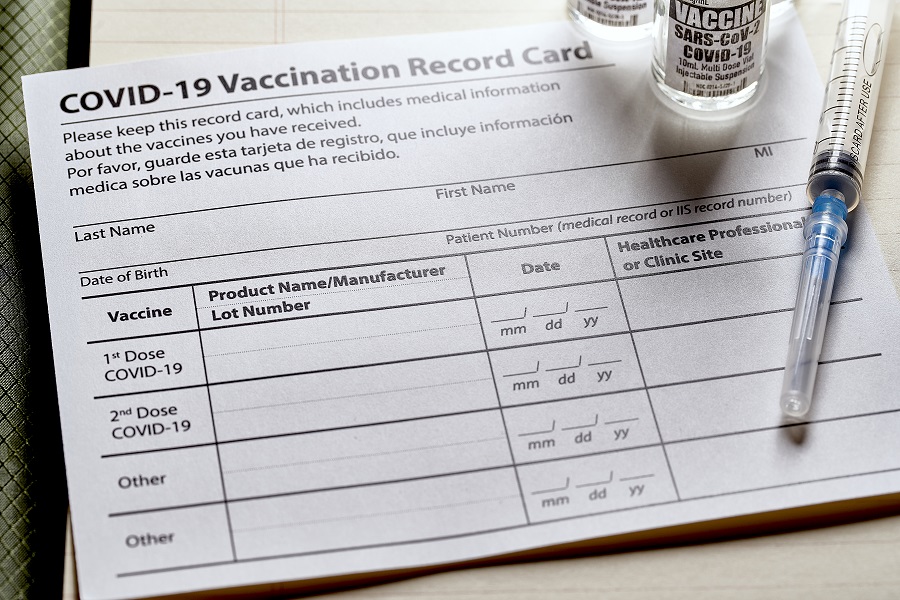
Faculty from the University of Minnesota and HealthPartners Institute recently published an analysis in JAMA Network Open on the first large-scale study in the U.S. to demonstrate that a patient’s language and need for an interpreter are associated with clinical outcomes.
The analysis found patients with a language preference other than English (LPOE) and those with limited English proficiency (LEP), as measured by interpreter need, were more likely to experience delays in COVID-19 vaccination and become hospitalized and/or die from COVID-19 compared to their peers who primarily speak English.
The team analyzed COVID-19 vaccine uptake rates and associated hospitalizations and deaths from December 2020 to March 2022 in a large health care system in Minnesota and Wisconsin that serves a uniquely multilingual population.
Key findings from the analysis include:
- Patients with LPOE and LEP experienced delays in receiving their first vaccine dose and increased rates of COVID-19–associated hospitalization and death.
- Patients with LPOE and LEP were approximately twice as likely to be hospitalized or die due to COVID-19 than English-speaking patients.
- Delayed time to vaccine and worse health outcomes patterns suggest patients with LPOE or LEP is a crucial risk factor influencing health disparities.
"This study suggests that routine data collection of a patient’s preferred language and interpreter needs should be standard of practice and could provide key information on improving health equity in the U.S.,” said William Stauffer, MD, a professor at the U of M Medical School and director of Human Migration and Health at the Center for Global Health and Social Responsibility.
Although racial and ethnic categories remain the most common method for describing U.S. health disparities, they provide minimal direct intervention information. Further analysis of language preference can increase local knowledge to identify social groups for engaging trusted messengers, forging community partnerships, developing culturally appropriate interventions and delivering messages in an acceptable, linguistically congruent medium.
"In a healthcare setting, language is more than a communication tool. It conveys respect, upholds a patient’s dignity, and gives patients autonomy over their care,” said lead author Nasreen Quadri, MD, an adjunct assistant professor affiliated with the U of M Medical School and physician collaborator with the National Resource Center for Refugees, Immigrants and Migrants.
This study was conducted as part of the faculty’s work for the National Resource Center for Refugees, Immigrants and Migrants. Funding was provided by the Centers for Disease Control and Prevention and the International Organization for Migration.
-30-
About the National Resource Center for Refugees, Immigrants and Migrants
The National Resource Center for Refugees, Immigrants, and Migrants (NRC-RIM) is funded by the U.S. Centers for Disease Control and Prevention to support health departments and community organizations working with refugee, immigrant, and migrant communities that have been disproportionately affected by health inequities. Learn more at nrcrim.org.
About the Office of Academic Clinical Affairs
The Office of Academic Clinical Affairs is reimagining health by driving innovation and discovery through collaborations across the University of Minnesota, advancing interprofessional care and training, and being a strong partner to the state, industry and community. Learn more at clinicalaffairs.umn.edu.
About the University of Minnesota Medical School
The University of Minnesota Medical School is at the forefront of learning and discovery, transforming medical care and educating the next generation of physicians. Our graduates and faculty produce high-impact biomedical research and advance the practice of medicine. We acknowledge that the U of M Medical School, both the Twin Cities campus and Duluth campus, is located on traditional, ancestral and contemporary lands of the Dakota and the Ojibwe, and scores of other Indigenous people, and we affirm our commitment to tribal communities and their sovereignty as we seek to improve and strengthen our relations with tribal nations. Learn more at med.umn.edu.




